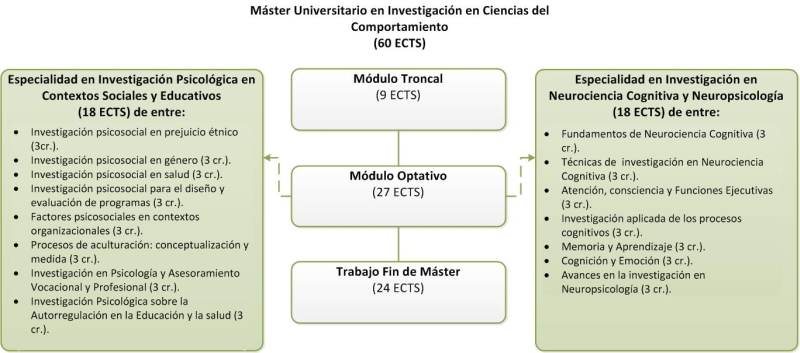Structure and distribution of credits
{{pre.error[0].message}}
{{pre.error[0].message}}
| Course | Basic | Mandatory | Optatives | Curricular internships | End of Studies Dissertation | Total |
|---|---|---|---|---|---|---|
| {{curso}}º | {{c.credects}} | {{c.credects}} | {{c.credects}} | {{c.credects}} | {{c.credects}} | {{creditos | map: 'credects' | toArray | sum}} |
| Total | {{ct.credects}} | {{ct.credects}} | {{ct.credects}} | {{ct.credects}} | {{ct.credects}} | {{cre.creditos_totales | map: 'credects' | toArray | sum}} |
The Master's is organised in 2 semesters within one academic year, each one has a teaching load of 30 ECTS.
The Master's consists of 3 modules: a core module, an elective module, and the Master's Thesis.
1. Core module. This module is composed of 9 ECTS credits distributed in 2 compulsory subjects with contents of research methodology. These compulsory contents will be taught in the first and second semesters and will have a face-to-face character with virtual support.
2. Elective Module. This module consists of 17 subjects of 3 ECTS credits each. A total of 51 ECTS credits are offered, among which students must choose the 27 ECTS credits to be taken in this Elective Module.
Students who wish to achieve the mention of a Specialisation in the Degree, out of the 27 ECTS credits to be taken in this Module, 18 of them must be chosen among the specific subjects of each Specialisation or pathway. The remaining 9 credits to be taken can be chosen among one or more of the following options: Remaining subjects of the same Pathway, subjects of another Pathway, subjects not associated with any Pathway, elective subjects offered in the Master's Degree in General Health Psychology.
Students wishing to complete the Master's without a mention of a specialisation in the Degree, may take the 27 ECTS credits of the Elective Module by choosing them freely from the total offer of elective subjects.
Specialisation/Pathway 1. Research in Cognitive Neuroscience and Neuropsychology. Students must take 18 elective ECTS among the following 7 subjects:
Specialisation /Pathway 2. Psychological Research in Social and Educational Contexts. Students must complete 18 elective ECTS credits among the following 8 subjects:
All the subjects offered in the Elective Module will be taught during the first and/or second semesters, and will have a face-to-face character with virtual support.
ATTENTION:
Those students who do not wish to obtain a mention of the specialisation in the degree must take 27 ECTS credits freely chosen from the offer of elective subjects described above.
Subjects not associated with the pathway:
3. Master’s Thesis. It is composed of 24 ECTS credits and it is compulsory. This work will consist of the preparation and realization of a research work, supervised by a professor or a doctor of the master's degree. It will be developed during the second semester (from February to June), and will be defended in June or September.
